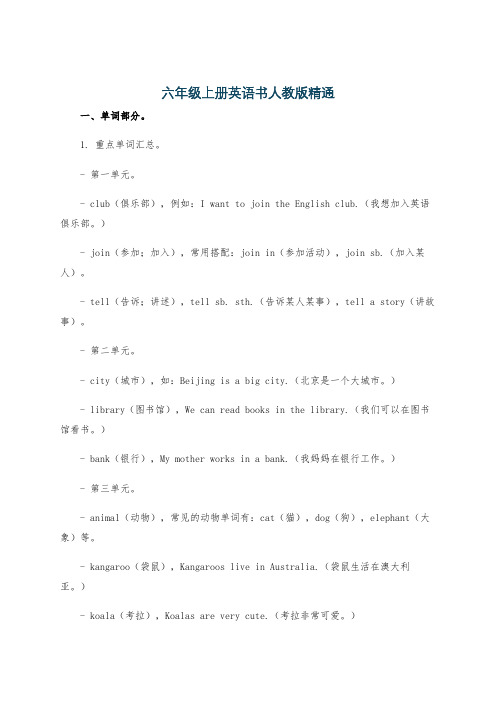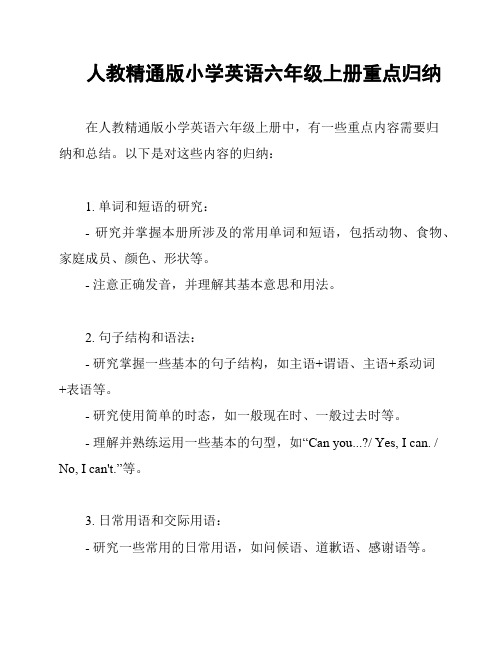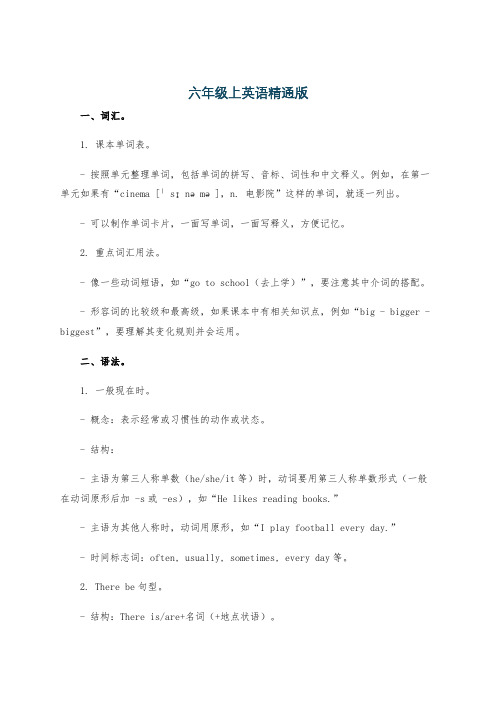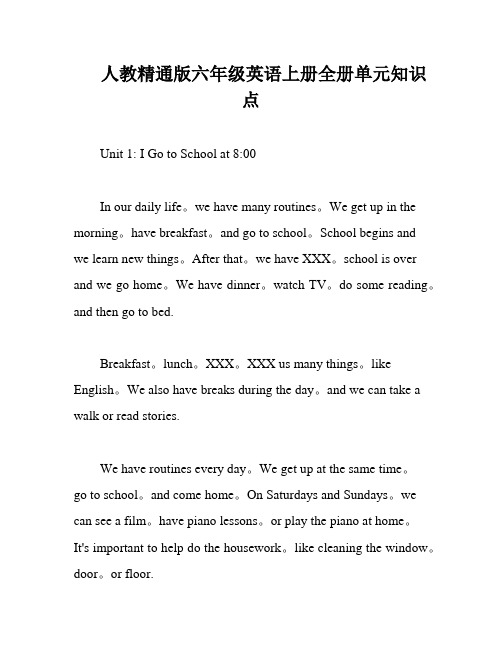人教精通版六年级英语上册全册单元知识点
人教精通版六年级英语上册各单元知识点汇总

人教精通版六年级英语上册各单元知识点汇总Unit 1 I go to school at 8:00.单元知识必备清单重点词汇breakfast 早餐lunch 午餐dinner 晚餐walk 走; 步行every 每一个morning 早晨evening 晚上; 傍晚often 时常; 常常afternoon 下午easy 容易difficult 困难重点短语see a film 看电影clean the window 擦窗户c lean the door 擦门clean the floor 擦地板get up 起床take a walk 散步go to school 去上学have breakfast 吃早餐go home 回家go to bed 睡觉cook breakfast 做早餐teach English 教英语read stories 读故事have lunch 吃午饭have dinner 吃晚饭play the piano 弹钢琴重点句型1 School begins at 9:00. 九点钟开始上课。
解读: 该句是一般现在时,其中主语School 是第三人称单数,所以谓语动词begin 用第三人称单数形式begins。
“School begins.”的同义句为“Class begins.”。
2 School is over at 3:30 in the afternoon. 下午三点半放学。
解读: 该句是谓语为系动词的一般现在时句型,主语School 是第三人称单数,所以be动词用is,“be over”意为“结束”,over 在此处是副词。
3 She gets up at 6:00 in the morning. 她在早晨六点起床。
She doesn’t get up at 6:30 in the morning. 她不在早晨六点半起床。
解读: 在一般现在时的肯定句中,主语是第三人称单数时,谓语动词要用第三人称单数形式。
六年级上册英语书人教版精通

六年级上册英语书人教版精通一、单词部分。
1. 重点单词汇总。
- 第一单元。
- club(俱乐部),例如:I want to join the English club.(我想加入英语俱乐部。
)- join(参加;加入),常用搭配:join in(参加活动),join sb.(加入某人)。
- tell(告诉;讲述),tell sb. sth.(告诉某人某事),tell a story(讲故事)。
- 第二单元。
- city(城市),如:Beijing is a big city.(北京是一个大城市。
)- library(图书馆),We can read books in the library.(我们可以在图书馆看书。
)- bank(银行),My mother works in a bank.(我妈妈在银行工作。
)- 第三单元。
- animal(动物),常见的动物单词有:cat(猫),dog(狗),elephant(大象)等。
- kangaroo(袋鼠),Kangaroos live in Australia.(袋鼠生活在澳大利亚。
)- koala(考拉),Koalas are very cute.(考拉非常可爱。
)- 第四单元。
- hobby(爱好),My hobby is painting.(我的爱好是绘画。
)- reading(阅读),He likes reading books.(他喜欢读书。
)- dancing(跳舞),She is good at dancing.(她擅长跳舞。
)- 第五单元。
- country(国家),China is a great country.(中国是一个伟大的国家。
)- Australia(澳大利亚),There are many unique animals in Australia.(澳大利亚有很多独特的动物。
)- Canada(加拿大),Canada is famous for its maple leaves.(加拿大以枫叶闻名。
人教精通版小学英语六年级上册单元知识点总结(全册)(完美版)

Unit1Igotoschoolat8:00.一、核心词汇1.描述日常活动的词汇cleanthewindow擦窗户cleanthedoor擦门cleanthefloor擦地板2.描述三餐的词汇breakfast早餐lunch午餐dinner晚餐3.描述时间的词汇morning早晨afternoon下午evening晚上; 傍晚4.频率副词often时常; 常常5.其他walk走; 步行every每一个easy容易difficult困难二、拓展词组描述日常活动的词组getup起床havebreakfast吃早餐gotoschool去上学havelunch吃午饭gohome回家havedinner吃晚饭watchTV看电视gotobed睡觉cookbreakfast做早餐teachEnglish教英语takeawalk散步readstories读故事seeafilm看电影playthepiano弹钢琴三、核心句型1.Igetupat7:30inthemorning. 我早晨七点半起床。
解读:此句是一个陈述句, 用来描述我在某一时刻所做的事情。
举一反三:Igotoschoolat8:00inthemorning. 我早晨八点去上学。
她不在上午六点半起床。
2.Shedoesn’tgetupat6:30inthemorning.解读: 此句是一个否定句, 用来描述某人在某一时刻没有做的事情。
举一反三:Shedoesn’tgetupat6:40.她不在六点四十分起床。
3.— WhatdoyoudoonSaturdays? 你星期六做什么?— Ioftengoandseeafilmwithmyparents. 我经常和我的父母一起去看电影。
解读:这是用来询问对方某天做什么及其回答的句子。
举一反三:— Whatdoyoudoontheweekend? 你周末做什么?— Ioftendohomework. 我经常做作业。
六年级英语上册(精通版)Unit 1必备知识点

六年级英语上册(精通版)Unit 1 I go to school at 8:00.必备知识点六年级英语上册(精通版)Unit 1 "I go to school at 8:00"的必备知识点主要包括词汇、词组、核心句型和语法等方面。
以下是对这些知识点的详细归纳:一、核心词汇1. 描述日常活动的词汇:clean the window(擦窗户)clean the door(擦门)clean the floor(擦地板)cook breakfast(做早餐)teach English(教英语)take a walk(散步)read stories(读故事)see a film(看电影)play the piano(弹钢琴)2. 描述三餐的词汇:breakfast(早餐)lunch(午餐)dinner(晚餐)3. 描述时间的词汇:morning(早晨)afternoon(下午)evening(晚上/傍晚)4. 其他常用词汇:often(时常;常常)walk(走;步行)every(每一个)easy(容易)difficult(困难)二、拓展词组1. 描述日常活动的词组:get up(起床)have breakfast(吃早餐)go to school(去上学)have lunch(吃午饭)go home(回家)have dinner(吃晚饭)watch TV(看电视)go to bed(睡觉)三、核心句型1. 描述个人日常活动的句型:I get up at 7:30 in the morning.(我早晨七点半起床。
)I have breakfast at 8:00.(我八点吃早餐。
)I go to school at 8:00 in the morning.(我早晨八点去上学。
)2. 否定句的使用:She doesn't get up at 6:30 in the morning.(她不在上午六点半起床。
小学英语人教精通版六年级上册重点归纳

小学英语人教精通版六年级上册重点归纳第一单元Unit 1 重点单词:lunch 午餐every 每一个evening 晚上difficult困难重点词组:1. daily life 日常生活3. in the morning 在早晨上午5. in the evening 在晚上7. have lunch 吃午餐walk 走;步行afternoon 下午easy容易2. get up 起床4. in the afternoon 在下午6. have breakfast 吃早餐8. have dinner 吃晚餐10. go home 回家12. do some reading 阅读14. cook breakfast 做早餐16. teach English 教英语18. every morning 每天早晨20. on Sundays 在星期日22. have Pia no IeSS OnS 上钢琴课24. at home 在家25. help sb. to do the housework帮助某人做家务26. clea n the door扌察门27. clean the window 擦窗户I go to school at 8:00dinner 晚餐morning 早上often时常;常常9. go to school 去上学11. watch TV 看电视13. go to bed 睡觉15. take a walk 散步17. read stories 读故事19. on Saturdays 在星期六21. see a film 看电影23. play the piano 弹钢琴28. clean the floor 擦地板重点句型:1.I don'h t ave breakfast at 7:00 in the morning .我不是在早上七点钟吃早餐。
2.She gets up at 6:00 in the morning 她. 在早上六点钟起床。
人教精通版小学英语六年级上册重点归纳

人教精通版小学英语六年级上册重点归纳
在人教精通版小学英语六年级上册中,有一些重点内容需要归
纳和总结。
以下是对这些内容的归纳:
1. 单词和短语的研究:
- 研究并掌握本册所涉及的常用单词和短语,包括动物、食物、家庭成员、颜色、形状等。
- 注意正确发音,并理解其基本意思和用法。
2. 句子结构和语法:
- 研究掌握一些基本的句子结构,如主语+谓语、主语+系动词
+表语等。
- 研究使用简单的时态,如一般现在时、一般过去时等。
- 理解并熟练运用一些基本的句型,如“Can you...?/ Yes, I can. / No, I can't.”等。
3. 日常用语和交际用语:
- 研究一些常用的日常用语,如问候语、道歉语、感谢语等。
- 研究并练简单的交际用语,如问答基本信息、提出请求、表达意见等。
4. 阅读理解:
- 阅读短文或简单的对话,理解其中的基本内容和信息。
- 掌握提取关键信息的技巧,如找出主题句、主要人物等。
5. 听力训练:
- 听取简短的对话或句子,理解其基本意思。
- 提高听力技巧,包括听清语音、辨别关键词等。
6. 书写和拼写:
- 研究正确书写和拼写常见的单词和短语。
- 注意字母大小写和书写规范。
以上是人教精通版小学英语六年级上册的重点归纳。
通过研究这些内容,可以提高英语听、说、读、写的能力,为接下来的研究打下基础。
> *注意:上述内容为总结归纳,具体细节和例句可详细阅读教材内容。
*。
六年级上英语精通版

六年级上英语精通版一、词汇。
1. 课本单词表。
- 按照单元整理单词,包括单词的拼写、音标、词性和中文释义。
例如,在第一单元如果有“cinema [ˈsɪnəmə],n. 电影院”这样的单词,就逐一列出。
- 可以制作单词卡片,一面写单词,一面写释义,方便记忆。
2. 重点词汇用法。
- 像一些动词短语,如“go to school(去上学)”,要注意其中介词的搭配。
- 形容词的比较级和最高级,如果课本中有相关知识点,例如“big - bigger - biggest”,要理解其变化规则并会运用。
二、语法。
1. 一般现在时。
- 概念:表示经常或习惯性的动作或状态。
- 结构:- 主语为第三人称单数(he/she/it等)时,动词要用第三人称单数形式(一般在动词原形后加 -s或 -es),如“He likes reading books.”- 主语为其他人称时,动词用原形,如“I play football every day.”- 时间标志词:often, usually, sometimes, every day等。
2. There be句型。
- 结构:There is/are+名词(+地点状语)。
- 区别:is用于单数名词或不可数名词,are用于复数名词。
例如“There is a book on the desk.”和“There are some books on the desk.”- 就近原则:如果be动词后面有多个名词,be动词的形式要根据离它最近的名词的单复数来确定,如“There is a pen and two pencils in the box.”三、句型。
1. 询问职业。
- What does your father do? He is a doctor.- 要学会替换不同的职业单词,如teacher, worker, driver等。
2. 询问爱好。
- What are your hobbies? I like singing and dancing.- 注意hobby(单数)和hobbies(复数)的用法区别。
人教精通版六年级英语上册全册单元知识点

人教精通版六年级英语上册全册单元知识点Unit 1: I Go to School at 8:00In our daily life。
we have many routines。
We get up in the morning。
have breakfast。
and go to school。
School begins andwe learn new things。
After that。
we have XXX。
school is over and we go home。
We have dinner。
watch TV。
do some reading。
and then go to bed.Breakfast。
lunch。
XXX。
XXX us many things。
like English。
We also have breaks during the day。
and we can take a walk or read stories.We have routines every day。
We get up at the same time。
go to school。
and come home。
On Saturdays and Sundays。
we can see a film。
have piano lessons。
or play the piano at home。
It's important to help do the housework。
like cleaning the window。
door。
or floor.In summary。
our daily life is full of routines and activities。
Some are easy。
while others are difficult。
but they all help us grow and learn.Unit 2 What's Your Hobby?Do you have any hobbies。
- 1、下载文档前请自行甄别文档内容的完整性,平台不提供额外的编辑、内容补充、找答案等附加服务。
- 2、"仅部分预览"的文档,不可在线预览部分如存在完整性等问题,可反馈申请退款(可完整预览的文档不适用该条件!)。
- 3、如文档侵犯您的权益,请联系客服反馈,我们会尽快为您处理(人工客服工作时间:9:00-18:30)。
人教精通版六年级英语上册全册单元知识点Unit 1 I go to school at 8:00重点词汇:1. get up起床2. have breakfast吃早餐3.go to school 去上学4.School begins.开始上课。
5.have lunch吃午饭6.School is over放学。
7.go home回家8.have dinner吃晚饭9.watch TV看电视10.go to bed睡觉11.breakfast早餐12.lunch午餐13.dinner晚餐14.cook breakfast做早餐15.teach English教英语16.take a walk散步17read stories读故事18. walk走;步行19. every每一个20. morning早晨21.afternoon下午22.evening晚上;傍晚23.see a film看电影24.play the piano弹钢琴25.clean the window擦窗户26.clean the door擦门27.clean the floor擦地板28.often时常29.easy容易30.difficult困难重点词组:1.daily life日常生活2.get up起床3.in the morning在早晨\上午4.in the afternoon在下午5.in the evening在晚上6.have breakfast吃早餐7.have lunch吃午餐8.have dinner吃晚餐9.go to school去上学10.go home回家11.watch TV看电视12.do some reading阅读13.go to bed睡觉14.cook breakfast做早餐15.take a walk散步16.teach English教英语17.read stories读故事18.every morning每天早晨19.on Saturdays在星期六20.on Sundays在星期日21.see a film看电影22.have piano lessons上钢琴课23.play the piano弹钢琴24.at home在家25.help sb.to do the housework帮助某人做家务26.clean the door擦门27.clean the window擦窗户28.clean the floor擦地板29.eat lunch吃午餐重点句型:1.I don’t have breakfast at7:00in the morning.我不是在早上七点钟吃早餐。
2.She gets up at6:00in the morning.她在早上六点钟起床。
3.She doesn’t get up at6:30in the morning.她不是在早上6:30起床。
4.What does Kate do on Saturdays?凯特在周六做什么?5.She usually plays the piano.她通常弹钢琴。
6.I have breakfast at7:30.我在7:30吃早饭。
7.I have lunch at12:00.我在12:00吃午饭。
8.I have dinner at6:00.我在6:00吃晚餐。
9.What do you do on Saturdays?你在周六干什么?10.I often go and see a film.我经常去看电影。
Unit 2 What's your hobby?重点词汇:1. collect toy cars搜集玩具汽车2. collect stamps搜集邮票3.collect maps搜集地图4.collect picture cards搜集图片5.open开;打开6.hobby爱好7.map地图8.box盒子9.colour颜色10.go fishing去钓鱼11.plant flowers种花12.cook meals做饭13.dad爸爸14.mum妈妈15.plant植物;种植16.flower花17.drink喝18.tea茶19.play computer games玩电脑游戏20.make dolls21.take photos照相22.photo照片23.kid小孩24.baby婴儿25.hungry饿的26.cry哭重点词组:1.a new toy car一辆新的玩具汽车2.have a look看一看3.collect toy cars收集玩具汽车4.collect stamps收集邮票5.collect maps收集地图6.collect picture cards收集卡片7.look at看8.plant flowers种花9.drink Chinese tea喝中国茶10.go fishing去钓鱼11.cook meals做饭12.be interested in…对……感兴趣13.make dolls做布娃娃14.play computer games玩电脑游戏15.take photos照相16.take good care of照顾好17.talk about谈论18.play basketball打篮球19.look for寻找20.in winter在冬天21.from…to…从……到……22.at night在夜间23.in the world在世界上重点句型:1.What’s your grandpa’s hobby?你爷爷的爱好是什么?2.His hobby is fishing.他的爱好是钓鱼。
3.What are you interested in?你对什么感兴趣?4.I’m interested in taking photos.我对拍照感兴趣。
5.What’s your hobby?你的爱好是什么?6.My hobby is collecting maps.我的爱好是收集地图。
6.What’s your dad’s hobby?你爸爸的爱好是什么?7.His hobby is planting flowers.他的爱好是种花。
Unit 3 Would you like to come to my birthday party?重点词汇:1.invite your friends to your party邀请朋友参加聚会2.celebrate your birthday with your friends与朋友庆祝生日3.time时间4.after在......后5.then那时6.me我(I的宾格)7.bye再见8.star-shaped cake星形蛋糕9.jelly果冻10.fruit pie水果派;水果馅饼11.kind种类12.chocolate巧克力13.ice cream冰激凌14.candy糖果15.sure当然16.light the candles点蜡烛17.sing the birthday song唱生日歌18.make a wish许愿19.blow out the candles吹蜡烛20.cut the cake切蛋糕21.eat the cake 吃蛋糕22.here在这里23.for给;为了24.light点燃重点词组:1.birthday party生日聚会2.after school放学后3.invitation card邀请卡4.invite your friends to your party邀请朋友参加聚会5.celebrate your birthday with your friends与朋友庆祝生日6.give a birthday card to your friend向朋友赠送生日贺卡7.star-shaped cake星形蛋糕8.heart-shaped cake心形蛋糕9.fruit pie水果派\水果馅饼10.light the candles点蜡烛11.sing the birthday song唱生日歌12.make a wish许愿13.blow out the candles吹蜡烛14.cut the cake切蛋糕15.eat the cake吃蛋糕16.a piece of cake一块蛋糕重点句型:1.What kind of cake would you like?你想要什么种类的蛋糕?2.I’d like a heart-shaped cake.我想要一个心形的蛋糕。
3.How do they celebrate the birthday?他们怎么庆祝生日的?4.First,they light the candles and then.首先,他们点燃蜡烛,然后……5.Would you like to come to my birthday party?你愿意来我的生日晚会吗?6.Sure.I’d love to.当然,我愿意。
7.Good bye!/Bye-bye!/Bye!再见。
8.Can I have some ice cream?我能吃些冰激凌吗?9.Here’s a birthday cake for you.这个生日蛋糕师送给你的。
10.invite your friends to your party邀请你的朋友到你的晚会11.celebrate your birthday with your friends .和你的朋友一起庆祝你的生日12.give a birthday card to your friend.把这个生日卡片给你朋友.Unit 4 January is the first month重点词汇:1.the first month of the year一年里的第一个月2.the second month of the year一年里的第二个月3.New Year's Day元旦4.Spring Festival春节5.January一月6.February二月7.back回原处;后面8.their他(她,它)们的9.the third month of the year一年里的第三个月10.the fourth month of the year一年里的第四个月11.Tree Planting Day植树节12.Easter复活节13.March三月14.April四月15.tree树;树木16.grass草;草地17.stop(使)停止18.egg蛋;卵19.the fifth month of the year一年里的第五个月20.the sixth month of the year一年里的第六个月bour Day劳动节22.May五月23.June六月24.Mother’s Day母亲节25.Children’s Day儿童节26.Father’s Day父亲节重点词组:1.the first month of the year一年里的第一个月2.the second month of the year一年里的第二个月3.New Year’s Day新年4.Spring Festival春节5.Tree Planting Day植树节bor Day\May Day劳动节7.Mother’s Day母亲节8.Children’s Day儿童节9.Father’s Day父亲节10.plant trees植树11.the third month of the year一年里的第三个月12.the fourth month of the year一年里的第四个月13.the fifth month of the year一年里的第五个月14.the sixth month of the year一年里的第六个月15.go back home回家16.in the south of China在中国南方17.all the day一整天18.in March在三月19.take a photo照相20.go on a trip旅行重点句型:1.January is the first month of the year.一月份是一年中的第一个月。
